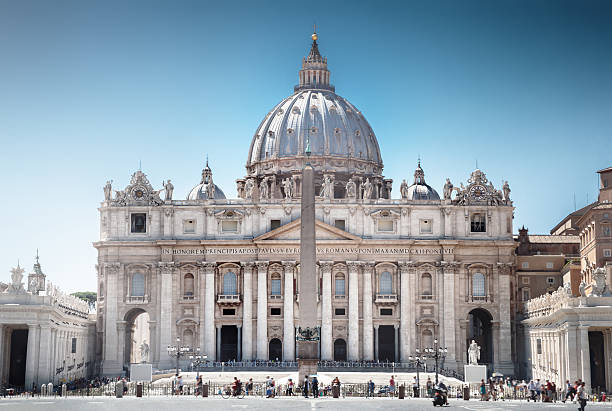
IS THERE SALVATION OUTSIDE THE CHURCH?
HOMILY FOR TWENTY-FIRST SUNDAY IN ORDINARY TIME, YEAR C. Readings: Isaiah 66:18-21; Psalm 117; Hebrew 12:5-7.11-13 and Luke 13:22-30.
A famous expression from the writings of Saint Cyprian of Carthage goes thus: “Outside the Church there is no salvation.” It is an axiom to indicate that the Church is necessary for salvation. Does this necessarily imply that anyone outside the church is condemned? Or anyone within the confines of the Church is automatically saved? Is salvation guaranteed by mere being a member of the Church or is it for all? What about the salvation of those in other religions? Based on this the readings of today are closely related with the message of hope for the salvation to all nations.
In the first reading, through the prophet God proclaimed salvation for all people. He said, “I am coming to gather all nations and tongues; and they shall come and shall see my glory and I will set a sign among them” (Is 66:18). This finds ultimate fulfillment in Rev 5:9-10 which says, “You are worthy to take the scroll and to open its seals, for you were slaughtered and by your blood you ransomed for God saints from every tribe and languages and people and nations.” God also promised to send people from other nations to go and proclaim him. Isaiah makes a prophetic reference to the missionary call and work of God’s people.
God had a missionary intent for Israel, that they will be priesthood among the nations “You shall be to Me a kingdom of priests and a holy nation” (Ex 19:6) and a light to the Gentiles. They are sent to Tarshish (end part of Spain), Pul and Lud… that have not heard my fame or see my glory; and they shall declare my glory among the nations. These places give indication of the end parts of the world and we recall the prophet Jonah running to Tarshish instead of Nineveh. With the thought that he can hide in a distant place from God. Invariably, the prophetic call of Isaiah is to bring salvation to the end parts of the world, not restricted to the Israelites. The prophet made three important points: that God will soon fulfill his promise of restoring us to himself; that we are called to be part of the glory of God; and that God will make us ambassadors to other nations.
To be God’s ambassador to other nations, the second reading presents some qualities of a good ambassador, among which are: being disciplined, obedience and perseverance. God disciplines and chastises his children. Sometimes, He may appear cruel in order to be kind. God is like the porter and clay described in Jer. 18; 1-17. He crushes us, treats us hard and finally molds us into a beautiful shape. In times of trial or stress, many Christians forget some basics. They seriously wonder if God is still in control or if He still loves them. We must admit that God does allow everything that happens and certainly has the power to stop evil. He is not the author of evil and will never be. According to St. Augustine, “God can bring forth good out of evil.” Chastising us is only a tool for correction and we must receive it gratefully. Chastisement is not regarded as the only reason God allows difficult times, but it is an important one. This is why St James recommends a prayer for wisdom in the context of enduring trials, “Whenever you face trials of any kind, consider it nothing but joy, because you know that the testing of your faith produces endurance; and let endurance have its full effect, so that you may be mature and complete, lacking nothing” (James1:2-4). In view of this, let us learn to endure and persevere like Christ who suffered and died on the cross to give salvation to all nations.
In response to the question about salvation, someone in the gospel asked Christ, “Lord, will those who are saved be few?” This person might have probably thought of only the Jews to be saved. For some of us, it is probably only baptized Catholics or only Christians that will be saved. Rather than occupy one’s self with quantity to be saved, Christ said, “Strive to enter by the narrow door; for many, I tell you, will seek to enter and will not be able” (v.24). The Greek word for ‘strive’ that is used here is ‘agonzesthe’ which literally means ‘agonize’ with the idea of ‘prize-fight’ and Christ is making his journey to Jerusalem where he will pass through agony for the salvation of man.
It is on this note that St. Paul speaks of athletic competition, which demands hard work and discipline when he said, “athlete exercise self control in all things” (1Cor. 9:25); invites us to fight the good fight, keep the battle and finish the race (2Tim 4:7) and training intensively in Godliness (1Tim 4:10). While salvation is a gift of God, it is clear that God expects us to cherish it as an athlete cherishes the victor’s crown, suggesting we need athlete’s discipline and determination in pursuing entrance through the narrow door. Here is another form of chastisement to bring out something good in us. Unfortunately, many Christians are unwilling to pay the prize of discipline in this race. The narrow door also implies we cannot bring with us unnecessary things. Therefore, we must strive in order to lay these things aside and come in. It is necessary to strive because there are many obstacles.
For those who do not strive, there will be weeping and gnashing of teeth when they see those that have strived with Abraham, Isaac and Jacob, and all the prophets, coming from the east and west, and from the north and south and sit at the Kingdom of God. Christ is saying there will be many from all over the world that will be saved. This was a shock to many Jewish people of His day that have been taught that salvation was only for the Jews, and not for the Gentiles. Invariably, the phrase, ‘outside the church no salvation’ does not exclude the possibility of salvation for non-Christians and we are reminded that all salvation comes from Christ through the Church, which is His Body. The catechism of the Church teaches us, “Every man who is ignorant of the Gospel and of Christ of His Church but seek the truth and does the will of God in accordance with his understanding of it, can be saved” (CCC, 1260). Hence, God’s message of salvation is for all people and Christ died for the sins of the whole world (Jn. 3:16). Whoever calls on the name of the Lord shall be saved (Rm. 10:13). God our Saviour desires all men to be saved and come to the knowledge of the truth (1Tim 2:4).
Happy Sunday!
Fr. Ken Dogbo, OSJ










